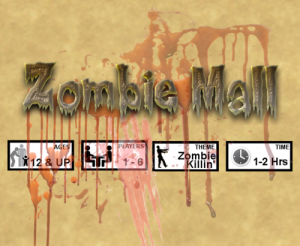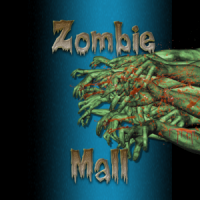Download Files
All the files from 2013.
- ZombieMall.zip - All the files. Don't have to bother downloading anything else. 288MB.
Basic Game
- Basic Game - ZIP. All basic game files listed below. 248MB.
- Quick Play Reference - PDF. 251KB.
- Basic Rule Book - PDF, 35 pages. 10MB.
- Walkthru - PDF, 45 pages of playthru with lots of pictures. 34MB.
- Cards - PDF, 162 regular size playing cards for Loot & Objectives. 136MB.
- Stat Cards - PDF for player stat tracking during game play. 2.2MB.
- Map Tiles - PDF, 47 6"x6" map tiles (the most downloaded file. 65MB.
- Tokens - PDF. All the tokens needed for "A Call for Help" scenario. 6.2MB.
Expansion 1: Brains on the Brain
- Expansion 1 - ZIP. All Expansion 1 files listed below. 6.5MB.
- Expansion 1 Rules - PDF. 3.6MB.
- Quick Reference Update - PDF, incorporates new rules into original Quick Reference. 190KB.
- Star Card w/ Score Track - PDF, standard page sized player stat card. 2MB.
- Tokens - PDF, New tokens introduced in Expansion 1. 1.1MB.
Expansion 2: Dead On Your Feet
- Expansion 2 - ZIP. All Expansion 2 files listed below. 34MB.
- Expansion 2 Rules - PDF. 4MB.
- Cards - PDF, 72 Character Cards, 6 Knocked Out Tokens, and 39 Starting Weapon Used tokens. 34MB.
Zombie Mall
Making Zombie Mall
 Zombie Mall started as a variant to Twilight Creations Zombies!!! after watching the 2004 version of Dawn of the Dead too many times.
Eventually the variant rules morphed into a stand-alone game that was begging for some spit and polish, which in turn morphed as an idea that was
begging to get out of a brain (zombie symbolism notwithstanding).
The development of Zombie Mall started a learning process of what's involved in making a board game. Logical rules that are also fun to play by can often
run counter to written rules that are easy to understand. Playtesting brings up the vast difference in how people play a game on top of how each interprets
written rules. Publishing guidlines, in case you want to offer more than a simple download link. Eventually Zombie Mall expanded beyond "Can I make this game?"
to "I HAVE to make this game!". There's a certain joy in seeing people play your game the first time when everything is finally making sense - rules, mechanics,
graphics. Zombie Mall may not be for everyone, but hopefully you can find some fun in playing it.
Zombie Mall started as a variant to Twilight Creations Zombies!!! after watching the 2004 version of Dawn of the Dead too many times.
Eventually the variant rules morphed into a stand-alone game that was begging for some spit and polish, which in turn morphed as an idea that was
begging to get out of a brain (zombie symbolism notwithstanding).
The development of Zombie Mall started a learning process of what's involved in making a board game. Logical rules that are also fun to play by can often
run counter to written rules that are easy to understand. Playtesting brings up the vast difference in how people play a game on top of how each interprets
written rules. Publishing guidlines, in case you want to offer more than a simple download link. Eventually Zombie Mall expanded beyond "Can I make this game?"
to "I HAVE to make this game!". There's a certain joy in seeing people play your game the first time when everything is finally making sense - rules, mechanics,
graphics. Zombie Mall may not be for everyone, but hopefully you can find some fun in playing it.
Print & Play?
Publishing a boardgame is expensive. It's fun, but expensive. The goal was to never try and make money off of Zombie Mall, it was a learning process for how to make
rules not just that someone else would understand, but that random people around the world would be willing to put forth the time to read in the first place. I've no idea
how many people may have actually read the rules versus downloading files for the graphics, but over 150 people downloaded files while I hosted them. The great part is that
it didn't cost those people anything to try out anything I published (rules, cards, maps).
While prototyping the game, I went a step beyond printing everything on my home printer. I tested out printing custom playing cards through ArtsCow
and Printer Studio in China.
The first time you're waiting on a deck of cards to be printed and shipped from China, with no idea of what will actually show up in the mail, it's quite exciting when you get
a chance to open a box and say "hey, I made that!" I also got the 6"x6" map tile cards printed at DriveThruCards as a prototype test when they first started offering that size
card (not sure if that's still an option with them). For a consistent playtest map, I pasted map tiles together in Photoshop to make a 30"x40" map that I printed at Staples,
which wasn't as expensive as it should have been thanks to a couple of coupons.
 Note to anyone else wanting to print maps at Staples. Keep the map size within their normal poster sizes and it's a lot more affordable.
Note to anyone else wanting to print maps at Staples. Keep the map size within their normal poster sizes and it's a lot more affordable.
For printed rule books, I went through Amazon's Create Space. For fun I was able to make printed versions available through Amazon and
even offer ePub/Kindle versions. Not surprisingly, nobody ever bought a damn thing (see, FREE print & play is my target audience).
Not everything worked. I tried getting custom chipboard tokens printed but that didn't turn out too well. I tried a variety of boxes to store all of my custom printed components
in, but no standard sizes seemed to hold everything like I wanted.
I would raid other games for components. Dice. Tokens. Figures - Zombies!!! is a great source for
little zombie figures. Especially when you have a couple of hundred laying around. At one point they sold the Shotgun Guys pawns and I picked up a couple of packs to replace
my player tokens. For fun, and due to a weird sale at one of those Chinese card manufacturers, I made Zombie Mall coasters (see the pic up on the right) which I still use on
my office desk.
Playtest Pics
Here's a batch of pictures from one of the playtest sessions. The components were ordered from various places (playing cards from China, a giant map printed at Staples).










